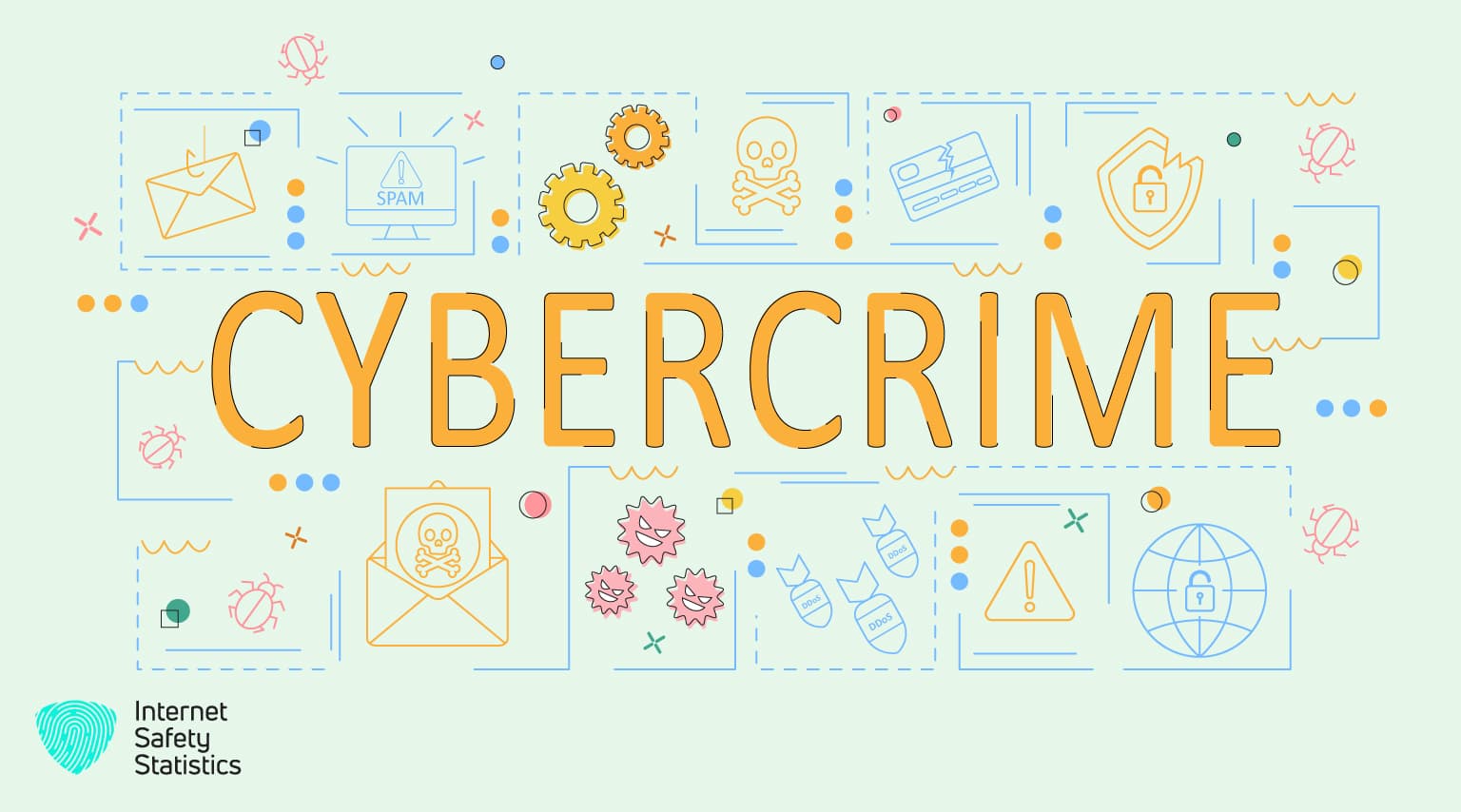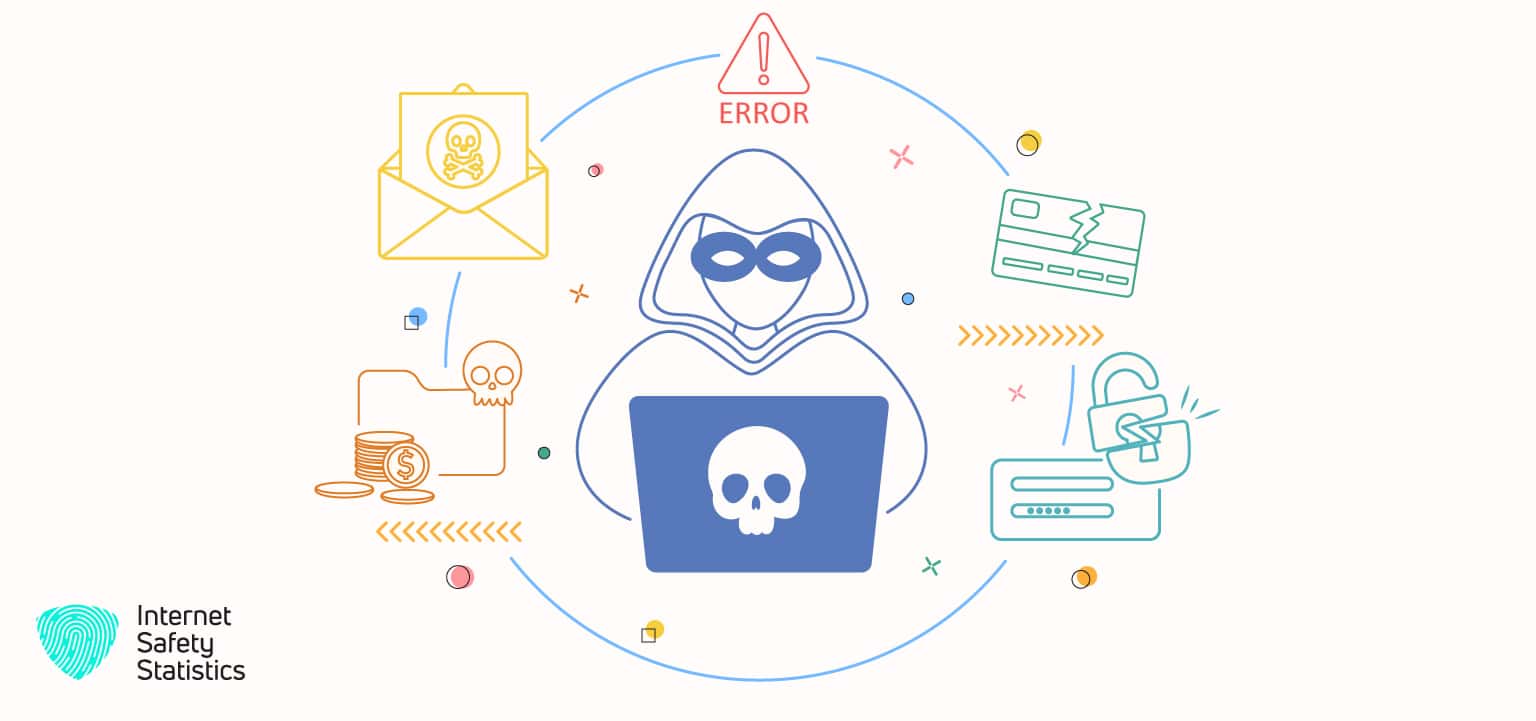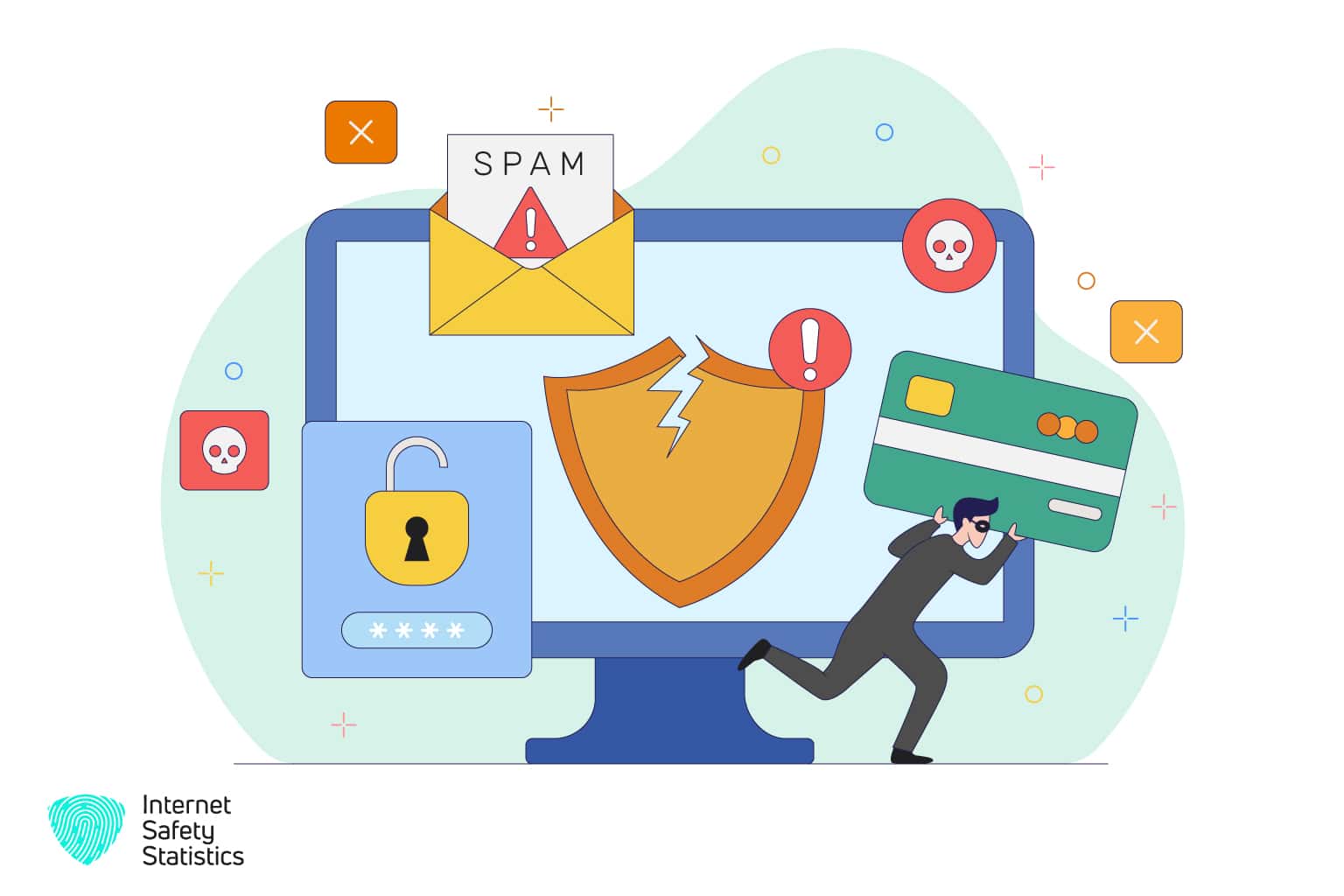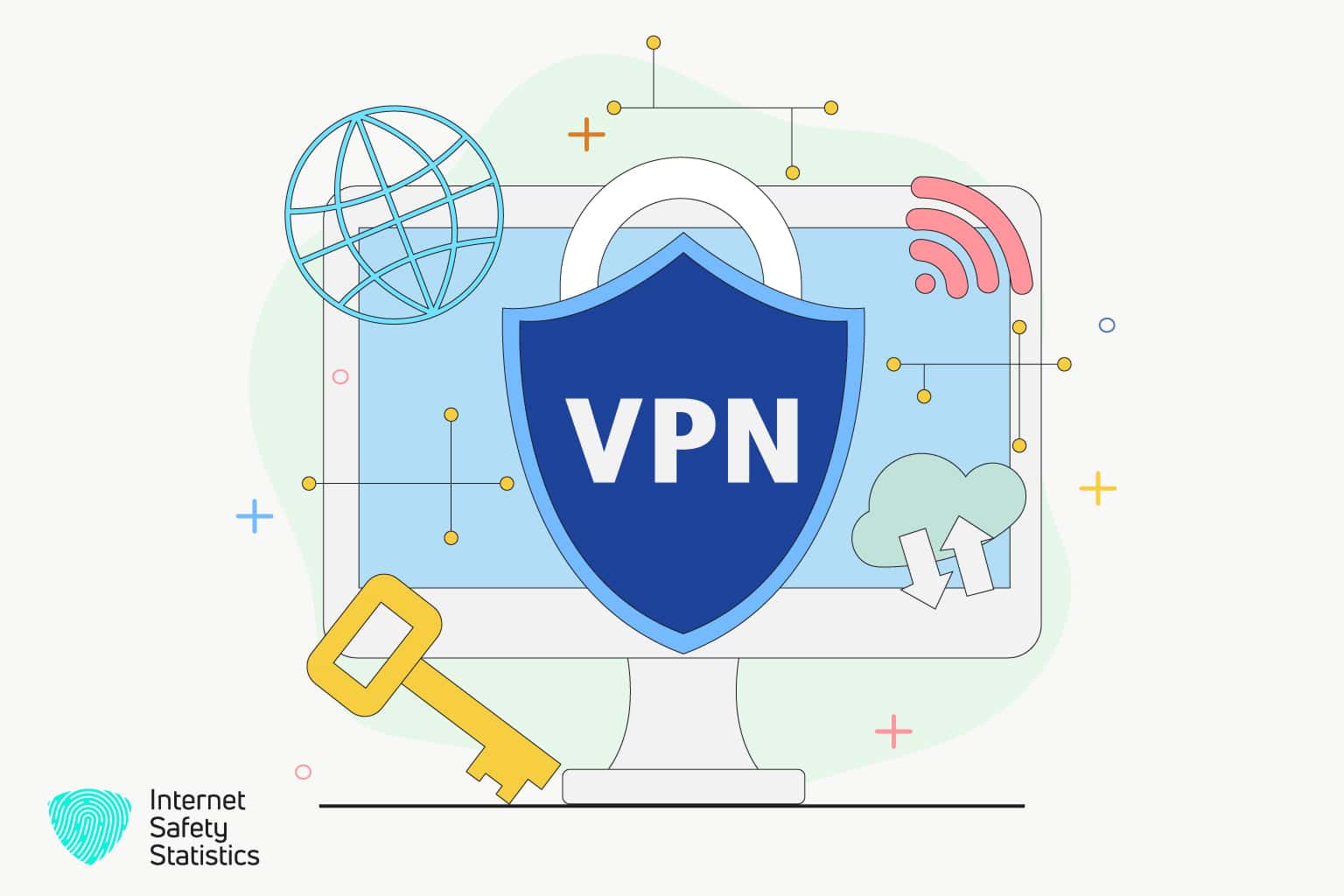
You might have received an email from someone who pretends to be a bank accountant or solicitor, informing you that someone has passed away and their surname is the same as yours. Then, they try to convince you to pretend to be the only legal heir of this deceased person so that you can receive millions of dollars.
The previous incident is called an email scam. If you accept, these scammers ask you to send your credit card number and other financial information to send you the money. Once you send them, they will steal your money.
Email scam is a common type of cybercrime in which scammers try to steal sensitive information or damage data through email. Cybercrime may also include hacking, malware, cyberextortion, and spoofing. In the following lines, we will find answers to: What is cybercrime? Why does it happen? And who are the most common cybercriminals?
Difference Between Cybercrime and Traditional Crime

A crime, in general, is any activity that involves breaking the law. However, there is a difference between traditional crime and cybercrime. Although criminals use manual ways to commit traditional crimes, cybercriminals use the internet and technology to commit cybercrimes.
Difference Between Cybercrime and Computer Crime
There is also a significant difference between cybercrime and computer crime. While computer crime involves the use of a computer, cybercrime occurs in cyberspace, using the internet and networked devices.
What is Cybercrime?
Cybercrime is any nefarious activity that uses or targets a computer, a networked device, or a computer network. A cybercriminal exploits any vulnerability to commit criminal activities.
Examples of Cybercrime
Cybercrime may include:
- Committing fraud,
- Stealing identities,
- Violating privacy,
- Stealing and selling corporate data,
- Trafficking in child pornography, and
- Stealing intellectual property.
Cyber-Enabled Crime vs Cyber-Dependent Crime
Now, let’s explore the difference between cyber-enabled crime and cyber-dependent crime. Cyber-enabled crime is a traditional crime carried out using the internet and the computer in certain circumstances. On the other hand, cyber-dependent crime is pure cybercrime committed using the internet, computer, and other forms of Information Communications Technology (ICT).
Examples of Cyber-Enabled Crimes and Cyber-Dependent Crimes
Some examples of cyber-enabled crime are harassment, financial fraud, theft, sexual grooming, and stalking. However, DDoS attacks, hacking, and malware are examples of cybercrimes that can be committed completely online. To explore the differences in detail, read our article about Cyber-Enabled Crimes vs Cyber-Dependent Crimes.
14 Common Categories of Cybercriminals
The individuals or teams who commit illegal activities on digital networks or systems using technology are called cybercriminals. They use various techniques to gain unauthorised access to computers, networks, or networked devices and achieve their malicious objectives. Difficult to identify, cybercriminals have their methods and techniques for hiding. They protect their identities by using different security measures, such as proxies and anonymity networks. In the following lines, you will know the most common categories of cybercriminals.
1. Hackers
A good hacker is a technical expert who uses computers and networks and has skills that allow them to solve any technical problem. On the other hand, a bad hacker uses their technical skills to gain unauthorised access to computers or networks, thus doing illegal activities. The intention plays an important role in classifying hackers as white, grey, and black hats. Check out The Different Types of Hackers You Should Know About.

2. Hacktivists
Another type of hacker is called the hacktivist, also written as a hactivist. Hacktivists are a group of cybercriminals who hack computers and networks. They aim to promote social change or political agenda.
3. Cyberterrorists
Similarly, the cyberterrorists’ primary objective is to achieve political or ideological gains. However, they attack computer systems, programmes, and data with the intention of causing or threatening damage or harm.
4. Organised Hackers
Organised hackers are a group of cybercriminals, state-sponsored hackers, hacktivists and terrorists. They are well-funded, organised, and prepared. Their target is power, control, and wealth.
5. Script Kiddies
A script kiddie, skiddie, or skid is a wannabe hacker. They use scripts or programs developed by others to carry out cyberattacks. In fact, they are not experts, but they search for online tutorials to know how to use these programs. Then, they begin working on these programs to attack computer systems and networks.
6. Disgruntled Employees
Another common category of hackers is a disgruntled current or former employee. S/he is a person who is unhappy and dissatisfied with the work environment or the behaviours of the leaders or supervisors. S/he might infect the organisation’s computers with viruses to hack into the system or the network and steal critical files. In addition, s/he could deploy ransomware and encrypt the organisation’s files, making them inaccessible. Then, s/he asks for ransom payment to decrypt those files.
7. Scammers
Among the common types of cybercriminals are scammers. A scammer commits or participates in an online fraudulent act; they use phone calls, robocalls, or text messages to steal your money or sensitive data. Here are the most common types of scams:
- Unexpected winning is one of the most common types of scams. A scammer may trick you into giving personal information to receive a prize. Of course, winning a competition without entering it is impossible.
- Fake charities are also among the common types of scams. A scammer can contact you, asking for donations. Then, they steal your money.
- Dating websites also tempt scammers to perpetrate scams. You can easily find a romantic partner on such websites, but be careful! Your partner may be just a scammer. They may get money from you. In addition, they can know a lot about your personal information and then steal your identity and commit malicious activities.
8. Cyberpirates
Cyberpirates are also common cybercriminals who commit unethical or illegal activities on the internet. They may steal, copy, or distribute software or intellectual property protected under copyright laws.
9. Cyberstalkers
Internet stalkers or cyberstalkers use the internet and digital means to stalk or harass individuals, groups, or organisations. They monitor you in a frightening and annoying way. They also write offensive and rude comments or posts online about you or release your confidential data.
10. Cyberfraudsters
Another type of cybercriminals is cyberfraudsters. Using the internet, they hide information or provide incorrect one to trick you. Their main aim is to illegally get money, goods, and more.
11. Spear Phishers
Spear phishers are cybercriminals who target an individual or a group of employees within an organisation. They send phishing emails with malicious links to steal sensitive data or financial information. These emails seem to be from a trusted sender, like the manager.
12. Identity Thieves
Identity thieves are among the common cybercriminals nowadays. An identity thief steals personal information and uses it to commit fraud or other crimes. With your stolen personal information, they may apply for loans, get medical services, or buy things.
13. Ransom Artists
Another type of cybercriminal is ransom artists. They modify codes and attack computers or networks using new ransom methods. They infect computers or networks with malware and ask for money to restore the stolen data.
14. Social Engineers
Rather than hacking, social engineers manipulate you psychologically to gain access to protected systems or critical data. They might impersonate someone you know and induce you to reveal confidential information. Their aim is to steal your money or penetrate your account.
Why is Cybercrime Increasing?

Cybercrime has become one of the fastest-rising modern crimes. It increases for several reasons, including working remotely, relying on technology, and developing the internet and technology. Moreover, the growing number of internet users tempts cybercriminals to pursue illegal activities because an enormous amount of sensitive data is stored online.
Why Does Cybercrime Happen?
There are several other reasons for cybercrime. Here are some of them:
1. Money
Money is always a motivator in any crime. Of course, financial incentive entices cybercriminals to engage in malicious acts, like phishing, malware use, and identity theft.
2. Personal Emotions Or Feelings
Not only is economic motivation a major reason for cybercrime. Cybercrime may also happen due to personal emotions or feelings towards someone. For example, disgruntled employees may install viruses on the computers of the organisation they are working in to hack into the network.
3. Lack of Awareness
Another primary reason for cybercrime is the lack of awareness. Not all internet users are aware of the simplest steps of cybersecurity. In fact, they do not protect their computers or network systems with antivirus software or firewalls. Most of those who receive phishing emails click on the malicious URLs inside, thus putting their sensitive personal and financial data at risk.
4. Computer or System Vulnerability
Besides the lack of awareness, computer or system vulnerability is also one of the top reasons cybercrimes happen. Usually, computers run on operating systems programmed with millions of codes. At the stage of programming, humans could make mistakes. When cybercriminals spot a human error, they take advantage of it, causing data breaches.
What are the Objectives of Cybercrime?
Generating profits is the primary objective of cybercrime. Hatred and jealousy are also among the main purposes of cybercrime. Cybercriminals use viruses to infect computers or other digital devices. They may also use different types of malware to damage or disable digital devices. Accordingly, they can steal or delete the sensitive data of a single user or enterprise.
Internet Anonymity Encourages Cybercrimes
You may prevent cybercriminals from getting illegal access to your sensitive data if you are anonymous online. However, internet anonymity also encourages cybercriminals to commit cybercrime. Cybercriminals implement anonymity to hide their identities and feel safer while committing fraud.
Cybercrime and the Use of A VPN

Using a Virtual Private Network (VPN) also entices cybercriminals to commit malicious activities. A VPN prevents anyone from seeing what they are doing. It encrypts all their activities and information sent on the internet, preventing law enforcement from detecting their IP addresses. Unfortunately, the police cannot track the users of a VPN. However, a court order may request information on connections or usage from your Internet Service Provider (ISP).
For users, a VPN cannot keep you safe online because it cannot protect you from phishing sites and malicious files. It also cannot prevent hacking and other malicious activities. Moreover, the VPN provider can watch your traffic since the VPN encrypts a part of the connection only.
However, a VPN may protect your privacy more because it redirects your internet traffic. It also stops people who access your computer or device without permission from reading the information you send on the internet.
When was the First Cybercrime Committed?
The first cybercrime was carried out before the internet came into existence in 1983. A couple of robbers hacked the French Telegram System in 1834 and stole information from the stock market. This data theft was considered the first cybercrime in the world.
6 Cybercrime-Associated Jobs
Cybersecurity is a growing industry in today’s digital world. It has become an essential part of every company’s strategy. The more the business grows, the more the demand for cybersecurity talents will be. Here are some of the jobs that deal with cybersecurity:
1. Cybercrime Investigator
A detective or a law enforcement investigator may investigate many types of crimes. However, investigating cyber or internet-based crimes requires a cybercrime investigator/ analyst. Working in a multi- or cross-jurisdictional environment, a cybercrime investigator can work in the private and public sectors. They gather crucial evidence from digital systems to help solve the cybercrime in hand.
A cybercrime investigator analyses computer systems and networks and recovers damaged or destroyed data and hidden information. On top of that, they access password-protected accounts and encrypted data and reconstruct cybercrimes. They also gather the information required to stop cybercriminals from continuing their cyberattacks. Among their main responsibilities are preparing expert affidavits, testimony, and reports on highly complex technical matters and testifying in court.
How to Become a Cybercrime Investigator?
To pursue a career as a cybercrime investigator, a Bachelor’s degree in Computer Science, Criminal Justice, Cryptography, Cybersecurity, or another related field is required. Community colleges offer a two-year associate degree in Criminal Justice, allowing aspiring cybercrime investigators to transfer to a four-year university or college and gain their Bachelor’s degree.
Professional Certifications
However, education may not be required if you worked for several years in the field. Since cybercrime investigation is cross-functional, experience in cybersecurity or criminal investigations can secure you a career as a cybercrime investigator after taking a professional certification. There are several professional certifications desired to qualify you to work as a cybercrime investigator. Among the most common professional certifications are:
- The Certified Information Systems Security Professional (CISSP). It requires working full-time as a security analyst for at least five years in two or more of the CISSP’s eight domains. CISSP allows you to fully understand security architecture, engineering, and management.
- The Certified Ethical Hacker (CEH) is another common certification. It demonstrates an in-depth knowledge of cyberattack methods.
- CompTIA certifications are other common certifications that qualify you to work in cybercrime investigation.
2. Cybercrime Lawyer
Another cybercrime-related job is a cybercrime lawyer who deals with all aspects of cybercrime. They argue cybercrime-related cases, including cyberthreats, cyberstalking, cyberbullying, cyberfraud, and identity theft.
3. Cybercrime Technology Adjunct
If you would like to work in universities and colleges, you can work as a cybercrime technology adjunct. In a computer science college, a cybercrime adjunct develops curriculum and learning strategies to promote the teaching/learning process. They also facilitate learning through out-of-classroom activities, classroom activities, distance learning experiences, and more.
4. Cyber Intelligence Analyst
Also known as a cyber threat analyst, a cyber intelligence analyst is an IT professional who conducts all-source analysis and digital forensics. They use their skills and knowledge in network engineering or administration to track, analyse, and counteract digital security threats. They work for the government, private corporations, or as an independent contractor.
How to Become A Cyber Intelligence Analyst?
Becoming a cyber intelligence analyst requires gaining a Bachelor’s degree in Information Systems, Computer Science, or another related field. However, education is not required if you are certified or have experience in the field.
Professional Certifications
Some examples of the required certifications are:
- Information Systems Security Engineering Professional (ISSEP),
- Global Information Assurance Certification (GIAC),
- Certified Information Systems Security Professional (CISSP), and
- Security+.
5. Cyberthreat Detection Engineer
Another cybercrime-associated job is a cyberthreat detection engineer. They design and implement security systems to protect devices, networks, and services from malicious cyberattacks. They also secure networks through configuration changes (i.e. basic firewalls) and deploy active prevention security suites (i.e. advanced firewalls and antivirus).
6. Cybercop or Cyberpolice
Also, among the common cybercrime-associated jobs is a cybercop, who enforces censorship on the internet. As a member of a cyberpolice force, a cybercop attempts to enforce netiquette (internet etiquette) and other cyber-related standards.
All in All
Cybercrime is rapidly evolving nowadays and is one of the biggest concerns around the globe. You should be aware of cybercrime types and techniques so you can protect yourself, your children, and your business. Have you experienced any cybercrime lately? How did you handle it?
